英语:Unit3《Understanding each other》课件(译林牛津版选修6)
文档属性
| 名称 | 英语:Unit3《Understanding each other》课件(译林牛津版选修6) |

|
|
| 格式 | zip | ||
| 文件大小 | 6.1MB | ||
| 资源类型 | 教案 | ||
| 版本资源 | 牛津译林版 | ||
| 科目 | 英语 | ||
| 更新时间 | 2012-04-10 00:00:00 | ||
图片预览



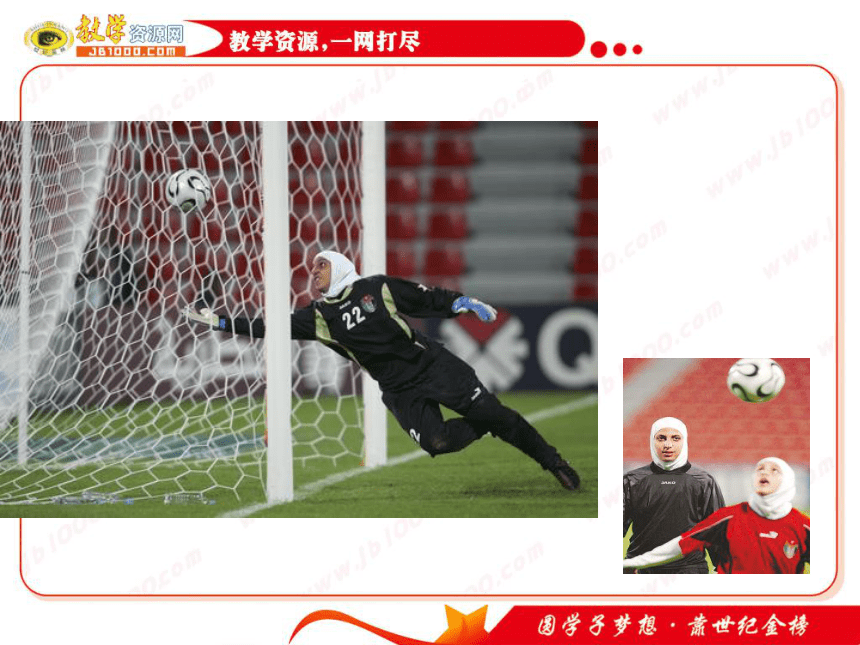
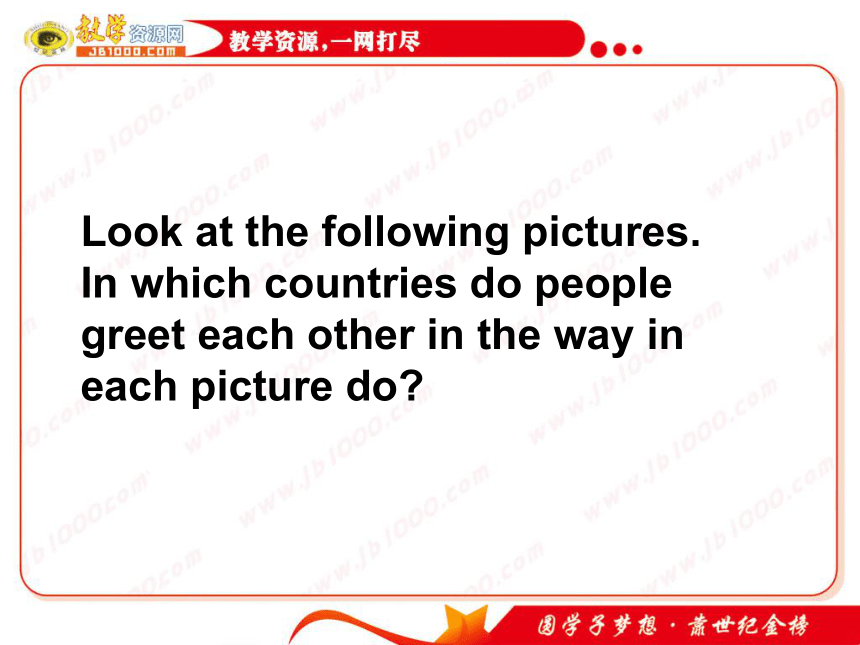


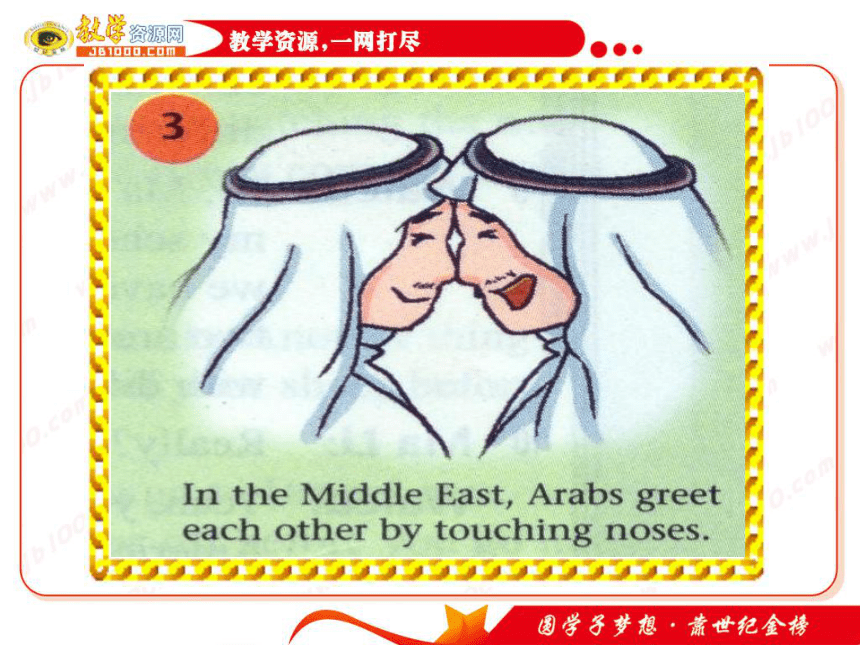
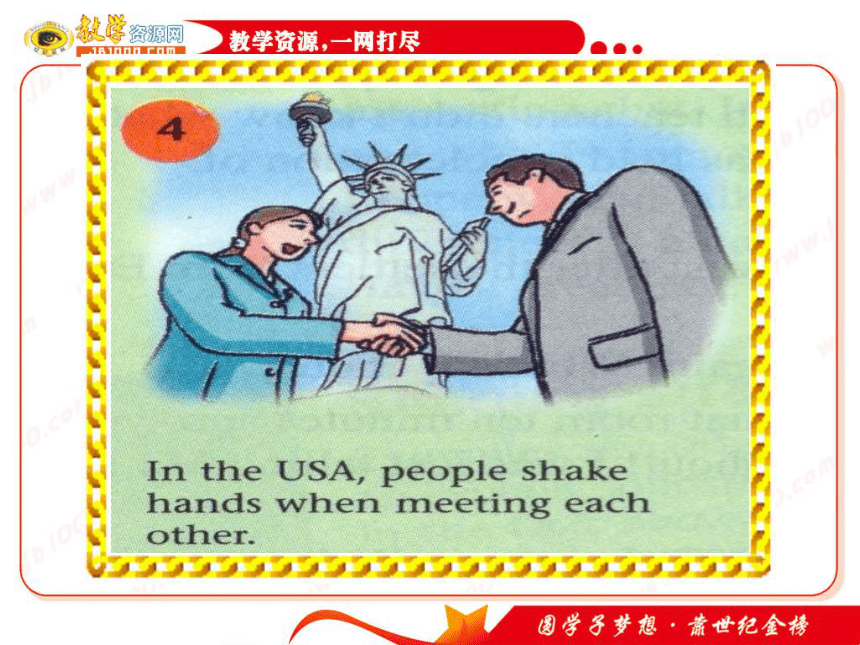
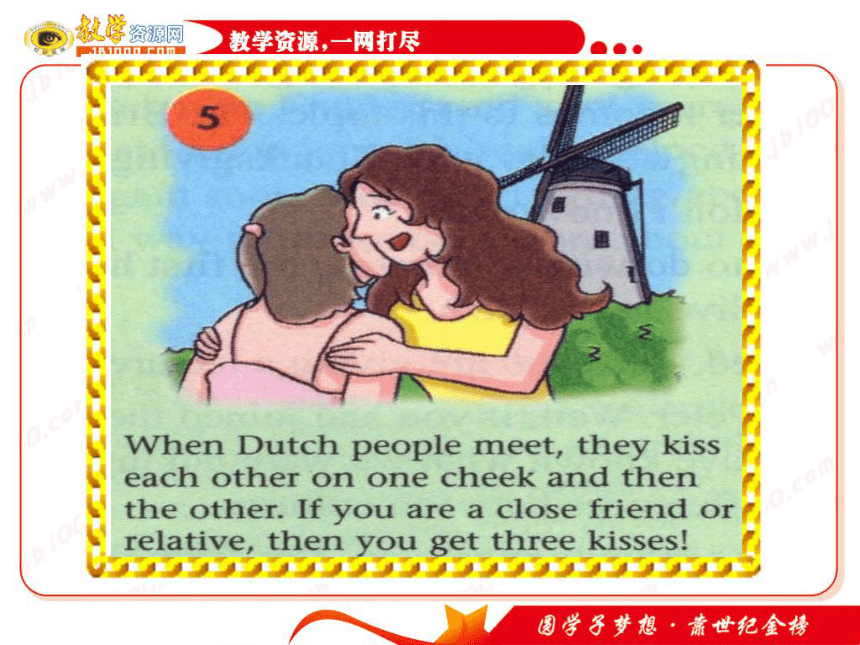
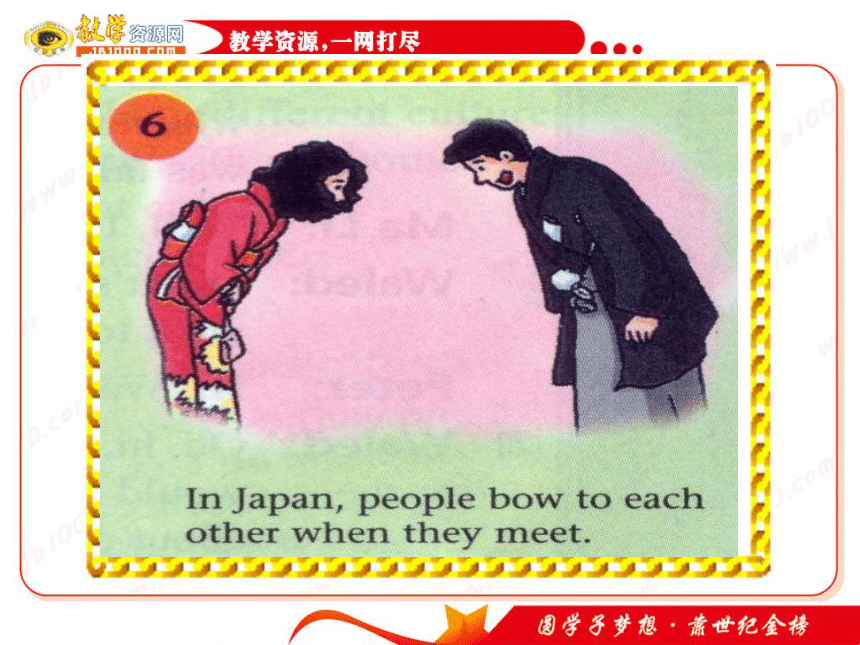
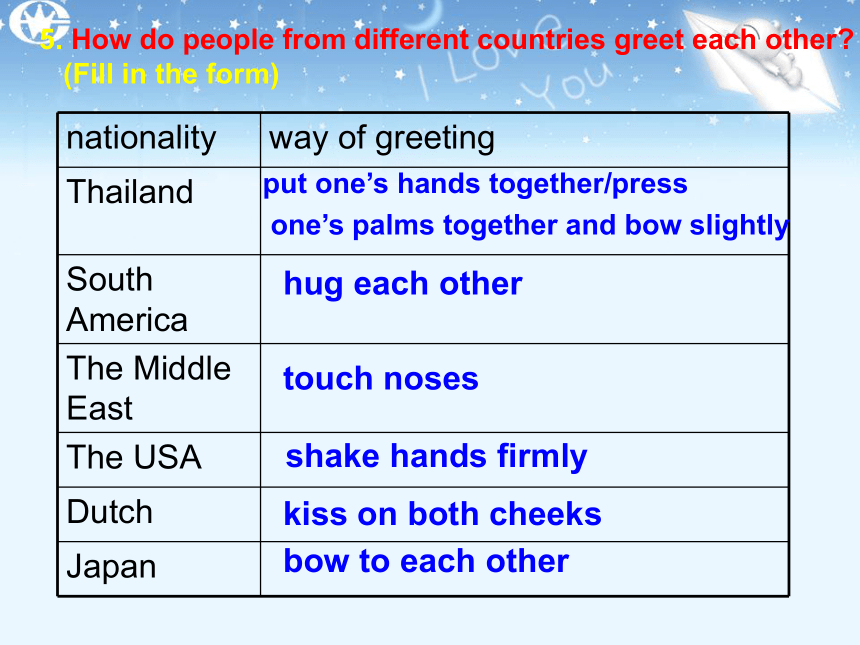
文档简介
(共49张PPT)
高二牛津(上)
Module 6 Making a better world
Unit 3 Understanding each other
Unit 3 Understanding each other
the first period
Look at the following pictures.
In which countries do people
greet each other in the way in
each picture do
5. How do people from different countries greet each other
(Fill in the form)
nationality way of greeting
Thailand
South America
The Middle East
The USA
Dutch
Japan
put one’s hands together/press
one’s palms together and bow slightly
hug each other
touch noses
shake hands firmly
kiss on both cheeks
bow to each other
Some of the South American
countries, Russia, France, Arab
countries…
Kiss:
Shaking hands:
In France, it is the custom to
shake hands with people in
the office every morning.
Britain, China…
What about an Arab and a Japanese
meeting for the first time
As a Chinese, if you are not familiar
with greetings from other countries,
what might happen
Maybe we would feel
embarrassed; we might
be involved in awkward
situations like…
Practice talking about cultural differences in pairs with the information in the form. You might follow the patterns below if you like.
A: It’s strange/ interesting/fascinating/ funny
that….
What do you think /How do you find it /
What’s your opinion about…
I agree. / I think it’s good manners/polite/
acceptable to…
Well, I think it’s just like the way we …
Sorry I don’t think so./ It’s bad manners/
rude/not acceptable to…
Discussion:
Why do you think that we should learn cultural differences between different nations
2. Which of the following words indicate the right attitudes towards cultural differences
To experience different cultures;
to get a better understanding…;
to help strengthen relations with…;
to avoid unnecessary mistakes and
embarrassment; to communicate
freely and effectively, to be a polite
Person, etc.
respect B. tolerate C. look down upon
D. appreciate E. hate F. understand
G. reject
ABDF
Do you know of any other ways
of greeting that people around
the world use
In English—speaking countries, there are some
formal greetings, such as “How are you ” and
“How have you been ”. There are also some
informal ways of greeting. For instance, people
often greet others that they know well with
“Hi!”, “hello”, “Hi there”, or “What’s up ”.
While in China, people tend to say ,
“Have you had your breakfast/lunch/supper ”
or “Where are you going ”
People in different countries greet
each other in different ways. Why
Firstly, cultural differences;
Secondly, people use different greetings
towards different people. For
example, their superiors and
their peers
Can you think of any other customs that
are different in different parts of the world
One custom that is different in the West
and in China is what to say when someone
gives you a compliment. In China, most
people would usually show some courtesies
first and then give a compliment in return to
the person.But in Western countries,
it is polite to accept the compliment
by saying “Thank you”.
1.
A test on cultural awareness: Guess the meaning
of the following gesture.
Good luck or
everything
goes well.
Someone
must be
crazy.
I don’t know
or I have
no idea.
I can’t/didn’t
hear you.
That’s enough
or it’s all
over for me.
‘Thumb down’ sign
indicates refusal
or rejection.
Something is
a bit suspicious
/odd here.
Come here.
‘OK’ in the USA.
In Italy, ‘Hello’; in
Malaysian,
‘Come here’.
‘Oh, I forgot’
or a sign of
surprise.
‘Slow down’,
‘Relax’, or
Wait a second’.
A guessing game:
Match the idioms with its meaning.
( ) 1. With open arms.
( ) 2. To keep a straight face.
( ) 3. To put your heads together.
( ) 4. To be all ears.
( ) 5. To shrug something off.
( ) 6. To be in over one’s head.
( ) 7. To keep one’s nose out of someone’s business
( ) 8. To pull a long face.
( ) 9. To let one’s hair down.
To disregarding sth.
To be involved in a project that is too difficult.
To act casually, to be oneself.
To listen attentively.
To work together with someone;
to share information.
Not to show one’s true feeling; not to laugh under most circumstances
To show that one is annoyed.
To pay attention to only one’s own concerns.
In a welcome and enthusiastic manner.
i
f
e
d
a
b
h
g
c
Table manners
What equipment do Chinese people use to have a meal
chopsticks
What equipment do western people use to have meals
knife
&
fork
Though many foreigners are awkward with chopsticks, more
and more foreigners are learning how to use them.
What does this imply
Further thinking
Look at the pictures and decide which
festival people are celebrating:
the Spring Festival
Christmas Day
Originally, Christmas Day was not celebrated by Chinese people.
However, more and more Chinese young people are crazy about this festival and they spend a lot of
time and money on it. Do you
support this move Why
Discussion
Can you think of any other customs
that are different in different parts of the world
Though we have different
cultures we all enjoy peace
and we should love each other.
1.ways of greeting
2.discuss sth with sb
3.greet sb by…
4.kiss sb on the cheek
Cultural Differences and Impacts
Chewing with Your Mouth Open张开嘴咀嚼食物
This is the opposite of western culture. The Chinese
appreciate that you make noise while eating.
Westerners feel this is disgusting and shows a complete
lack of manners. Chew with your mouth shut!
5. Look at the pictures below:
(1) adv. at or to a lower level, position
or place 在或向较低处
她从上山上看下下面的山谷.
She looked down from the mountain
to the valley below.
(2) adv. under the surface 在地下
The captain told the sailors to go below.
船长吩咐海员们到下面去.
(3) prep. lower than; under 在…下;低于
Children below the age of 16 are not
allowed to enter.
十六岁以下的孩子不允许进去.
2. discuss the following questions with…:
(1) adj. next (to be mentioned) 随后的
The child was sick in the evening,
but on the following day he seemed
well again.
这个孩子晚上生病了,但第二天似乎又好了.
(2) prep. after an event or as a result of
在…之后
Following the speech, there will be a
few minutes for questions.
演讲之后,将会有几分钟的时间提问题.
3. touch: V. [T]
(1) be or come together with 9sth. else)
so that there is no space between
接触,触及
One of the branches was touching
the water.
其中的一根树枝触及水面.
(2) make (sb./sb.s feelings) sympathetic
or sad 感动(某人); 触动(某人的感情)
We were all deeply touched by his tragic
experience.
我们都被他的悲剧性的经历深深地打动了.
touch用作名词的相关短语:
get in touch with 与…取得联系
keep in touch with 与…保持联系
lose touch with 与…失去联系
out of touch with 与…不联系
Homework:
Unit Revision: P93-94 Period 1.
Preview Reading part
Good staying with you!
The end !
高二牛津(上)
Module 6 Making a better world
Unit 3 Understanding each other
Unit 3 Understanding each other
the first period
Look at the following pictures.
In which countries do people
greet each other in the way in
each picture do
5. How do people from different countries greet each other
(Fill in the form)
nationality way of greeting
Thailand
South America
The Middle East
The USA
Dutch
Japan
put one’s hands together/press
one’s palms together and bow slightly
hug each other
touch noses
shake hands firmly
kiss on both cheeks
bow to each other
Some of the South American
countries, Russia, France, Arab
countries…
Kiss:
Shaking hands:
In France, it is the custom to
shake hands with people in
the office every morning.
Britain, China…
What about an Arab and a Japanese
meeting for the first time
As a Chinese, if you are not familiar
with greetings from other countries,
what might happen
Maybe we would feel
embarrassed; we might
be involved in awkward
situations like…
Practice talking about cultural differences in pairs with the information in the form. You might follow the patterns below if you like.
A: It’s strange/ interesting/fascinating/ funny
that….
What do you think /How do you find it /
What’s your opinion about…
I agree. / I think it’s good manners/polite/
acceptable to…
Well, I think it’s just like the way we …
Sorry I don’t think so./ It’s bad manners/
rude/not acceptable to…
Discussion:
Why do you think that we should learn cultural differences between different nations
2. Which of the following words indicate the right attitudes towards cultural differences
To experience different cultures;
to get a better understanding…;
to help strengthen relations with…;
to avoid unnecessary mistakes and
embarrassment; to communicate
freely and effectively, to be a polite
Person, etc.
respect B. tolerate C. look down upon
D. appreciate E. hate F. understand
G. reject
ABDF
Do you know of any other ways
of greeting that people around
the world use
In English—speaking countries, there are some
formal greetings, such as “How are you ” and
“How have you been ”. There are also some
informal ways of greeting. For instance, people
often greet others that they know well with
“Hi!”, “hello”, “Hi there”, or “What’s up ”.
While in China, people tend to say ,
“Have you had your breakfast/lunch/supper ”
or “Where are you going ”
People in different countries greet
each other in different ways. Why
Firstly, cultural differences;
Secondly, people use different greetings
towards different people. For
example, their superiors and
their peers
Can you think of any other customs that
are different in different parts of the world
One custom that is different in the West
and in China is what to say when someone
gives you a compliment. In China, most
people would usually show some courtesies
first and then give a compliment in return to
the person.But in Western countries,
it is polite to accept the compliment
by saying “Thank you”.
1.
A test on cultural awareness: Guess the meaning
of the following gesture.
Good luck or
everything
goes well.
Someone
must be
crazy.
I don’t know
or I have
no idea.
I can’t/didn’t
hear you.
That’s enough
or it’s all
over for me.
‘Thumb down’ sign
indicates refusal
or rejection.
Something is
a bit suspicious
/odd here.
Come here.
‘OK’ in the USA.
In Italy, ‘Hello’; in
Malaysian,
‘Come here’.
‘Oh, I forgot’
or a sign of
surprise.
‘Slow down’,
‘Relax’, or
Wait a second’.
A guessing game:
Match the idioms with its meaning.
( ) 1. With open arms.
( ) 2. To keep a straight face.
( ) 3. To put your heads together.
( ) 4. To be all ears.
( ) 5. To shrug something off.
( ) 6. To be in over one’s head.
( ) 7. To keep one’s nose out of someone’s business
( ) 8. To pull a long face.
( ) 9. To let one’s hair down.
To disregarding sth.
To be involved in a project that is too difficult.
To act casually, to be oneself.
To listen attentively.
To work together with someone;
to share information.
Not to show one’s true feeling; not to laugh under most circumstances
To show that one is annoyed.
To pay attention to only one’s own concerns.
In a welcome and enthusiastic manner.
i
f
e
d
a
b
h
g
c
Table manners
What equipment do Chinese people use to have a meal
chopsticks
What equipment do western people use to have meals
knife
&
fork
Though many foreigners are awkward with chopsticks, more
and more foreigners are learning how to use them.
What does this imply
Further thinking
Look at the pictures and decide which
festival people are celebrating:
the Spring Festival
Christmas Day
Originally, Christmas Day was not celebrated by Chinese people.
However, more and more Chinese young people are crazy about this festival and they spend a lot of
time and money on it. Do you
support this move Why
Discussion
Can you think of any other customs
that are different in different parts of the world
Though we have different
cultures we all enjoy peace
and we should love each other.
1.ways of greeting
2.discuss sth with sb
3.greet sb by…
4.kiss sb on the cheek
Cultural Differences and Impacts
Chewing with Your Mouth Open张开嘴咀嚼食物
This is the opposite of western culture. The Chinese
appreciate that you make noise while eating.
Westerners feel this is disgusting and shows a complete
lack of manners. Chew with your mouth shut!
5. Look at the pictures below:
(1) adv. at or to a lower level, position
or place 在或向较低处
她从上山上看下下面的山谷.
She looked down from the mountain
to the valley below.
(2) adv. under the surface 在地下
The captain told the sailors to go below.
船长吩咐海员们到下面去.
(3) prep. lower than; under 在…下;低于
Children below the age of 16 are not
allowed to enter.
十六岁以下的孩子不允许进去.
2. discuss the following questions with…:
(1) adj. next (to be mentioned) 随后的
The child was sick in the evening,
but on the following day he seemed
well again.
这个孩子晚上生病了,但第二天似乎又好了.
(2) prep. after an event or as a result of
在…之后
Following the speech, there will be a
few minutes for questions.
演讲之后,将会有几分钟的时间提问题.
3. touch: V. [T]
(1) be or come together with 9sth. else)
so that there is no space between
接触,触及
One of the branches was touching
the water.
其中的一根树枝触及水面.
(2) make (sb./sb.s feelings) sympathetic
or sad 感动(某人); 触动(某人的感情)
We were all deeply touched by his tragic
experience.
我们都被他的悲剧性的经历深深地打动了.
touch用作名词的相关短语:
get in touch with 与…取得联系
keep in touch with 与…保持联系
lose touch with 与…失去联系
out of touch with 与…不联系
Homework:
Unit Revision: P93-94 Period 1.
Preview Reading part
Good staying with you!
The end !
